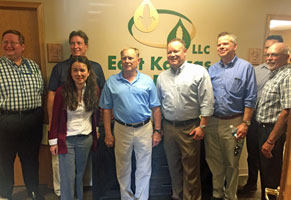Federal and regional EPA personnel toured the 45 million gallon per year corn ethanol plant, examined progress on EKAE’s co-located renewable diesel project, and discussed the importance of the RFS with plant management and local investors. EPA also hand-delivered a letter to EKAE approving the company’s efficient producer pathway petition, which certifies that the company’s ethanol reduces GHG emissions by 27.2 percent compared to petroleum.
“Today’s event provided an excellent opportunity for key EPA officials to see firsthand the ethanol industry’s innovation and ingenuity,” said Jeff Oestmann, CEO of EKAE. “We were honored to host EPA, and we thank them for spending a few hours with us to learn more about the ethanol process, renewable diesel, and the importance of the biofuels industry to the Garnett community. We had a very productive discussion and hope they left here with a new appreciation for both the challenges and opportunities facing ethanol producers today.”
EKAE, which was founded by local farmers and business leaders, produced its first gallon of ethanol one month before the original RFS was adopted in 2005. In 2014, the company broke ground on a bolt-on renewable diesel facility, which will convert the corn distillers oil already produced at the plant into low-carbon advanced biofuel.
RFA Senior Vice President Geoff Cooper, who also attended the tour, said EKAE is proof that the RFS is working. “EKAE is an excellent example of how the RFS provided the stability needed for first-generation biofuels like corn ethanol to succeed and flourish, then delivered the investment certainty required to develop second-generation biofuels like renewable diesel from corn distillers oil,” he said.
Both Oestmann and Cooper will be testifying today at the EPA hearing in Kansas City, along with more than 250 other industry stakeholders.
Listen to an interview with Oestmann and Cooper about the plant tour and hearing here: Interview with Jeff Oestmann, EKAE and Geoff Cooper, RFA


